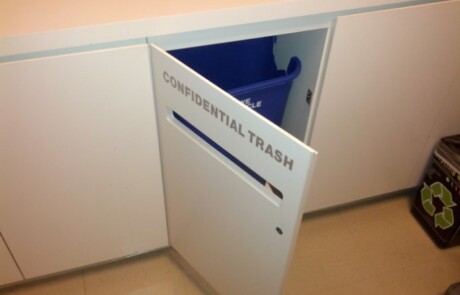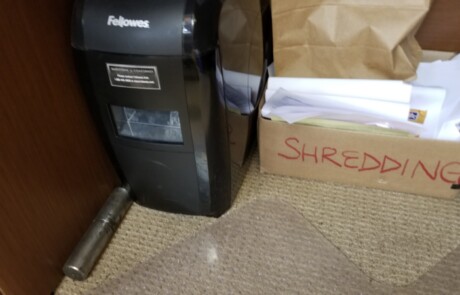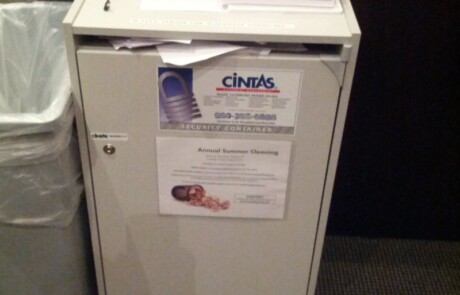Former Lumentum Executive Pleads Guilty To Insider Trading
Another episode of “How TSCM can help secure your information”.
Loss of control of confidential information is a big deal. It can happen in many ways, deliberate espionage using wiretapping, bugging, and cyber breaches are a few methods that are commonly recognized. It is also important to recognize that overheard conversations and discussions may also break the necessary confidentiality.
When this happens it could lead to loss of trade secret information, confidential dealings, plans leaked to competitors, or, as in this case, information on upcoming acquisitions were leaked for personal benefit. Amit Bhardwaj was the CISO (Chief Information Security Officer) at Lumentum Holdings Inc. He learned of discussions going on regarding pending acquisitions and shared that with friends and family. Their stock trading resulted in profit of approximately $4.3 million.
From the DOJ press release:
“Amit Bhardwaj, the former Chief Information Security Officer of Lumentum, ironically failed to keep the confidential information he was trusted with secure as he shared it with numerous friends and a family member in order to make a profit. Not only did Bhardwaj betray his company and cheat the securities markets, but when confronted by the FBI, he also schemed to conceal his illicit behavior and obstruct the investigation.”
What happened:
In approximately December 2020, BHARDWAJ learned that Lumentum was considering acquiring Coherent, Inc (“Coherent”). Based on this information, BHARDWAJ himself purchased Coherent stock and call options, and BHARDWAJ tipped three associates –– his friend Dhirenkumar Patel, another friend, and one of BHARDWAJ’s close family relatives ––and these individuals all traded in Coherent securities as a result. BHARDWAJ and Patel agreed that Patel would pay BHARDWAJ 50% of the profits that Patel earned by trading in Coherent based on the MNPI provided by BHARDWAJ. When Coherent’s stock price increased substantially following the announcement of the Lumentum acquisition, BHARDWAJ, his close family member, his friend Patel, and another friend closed their positions in Coherent securities and collectively profited by nearly $900,000.
In or about October 2021, BHARDWAJ learned that Lumentum was engaged in confidential discussions with Neophotonics Corporation (“Neophotonics”) about a potential acquisition. BHARDWAJ provided this information to SRINIVASA KAKKERA, ABBAS SAEEDI, and Ramesh Chitor, and these individuals all traded in Neophotonics securities as a result. In connection with Chitor’s trading, BHARDWAJ and Chitor agreed that Chitor and BHARDWAJ would split the profits equally. When Neophotonics’ stock price increased substantially following the announcement of the Lumentum acquisition in November 2021, KAKKERA, SAEEDI, and Chitor closed their positions in Neophotonics securities and made collectively approximately $4.3 million in realized and unrealized profits.
After they were interviewed by the Federal Bureau of Investigation (“FBI”) voluntarily and served with federal grand jury subpoenas on approximately March 29, 2022, BHARDWAJ took steps to obstruct the federal investigation of their conduct. On the day of the March 29, 2022, FBI interviews, BHARDWAJ drove to the homes of certain of his co-conspirators to encourage them not to tell the federal authorities the truth about their insider trading scheme. BHARDWAJ and his associates subsequently met in person on multiple occasions and discussed, among other things, potential false stories that would conceal their insider trading scheme as well as creating false documents to buttress lies regarding payments that were, in reality, related to the insider trading scheme.
BHARDWAJ, 49, of San Ramon, California, pled guilty to seven counts of securities fraud and two counts of wire fraud, each of which carries a maximum term of 20 years in prison, and four counts of conspiracy to commit securities fraud and wire fraud, each of which carries a maximum term of five years in prison.
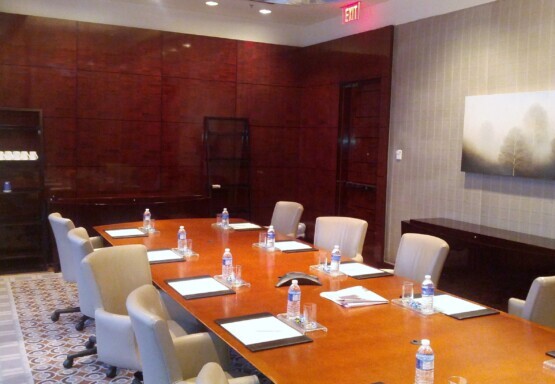

Protect your conference rooms and offices.
Confidential discussions and conversations take place regularly in the C-Suite and the offices of high level executives.
Conducting regular TSCM (Technical Surveillance Countermeasures) inspections is one of the major steps needed to protect those discussions and confidential information.
Often TSCM is only thought of as searching for hidden electronic devices. It is really much more than that. In the TSCM inspection, all ways that information and conversations may be overheard are considered. Yes, there is always a concern that an adversary may have planted a sophisticated listening device of some sort, but more often, and perhaps more significant, is the danger posed by insider threat and the easy ways with which insiders may have unauthorized access to confidential information.
Here are few examples to consider:
- Air vents may allow sound to travel from a conference room to nearby rooms.
- While inspecting a conference room we heard voices coming through the wall in one corner. The room next door was set up for coffee breaks. If we could hear people in that room, then surely those in the room could also hear the meeting content! (After our report, the heating vent was filled with insulation and the coffee machine moved to a different area.)
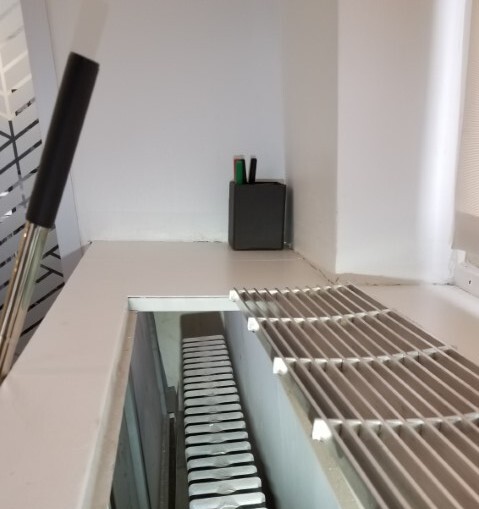
Air vent extends between conference room and adjoining area, allowing sound to travel freely between the spaces.
- Access control may be lacking, broken, or tampered with, allowing unfettered entrance to what should be secured areas
- We came to a corporate facility to sweep the main conference room prior to a sensitive board meeting. Upon arriving we noted that the door to the secure room was unlocked. Someone had taped over the door strike which kept the door from locking. Our security escort removed the tape and figured his job was done. Sure, there could have been an innocent reason, perhaps the AV tech had to go in and out so many times he didn’t want to have to use his badge, and just forgot to take the tape off when he was done. But wait, there’s more… just outside the conference room there was a door to the fire exit stairwell. That, too, was expected to be secure, to only allow egress in case of fire- it was not to allow people access to the floor. Upon checking the fire door we found the door locking mechanism was damaged. The door was not secure! Anyone from other floors in the building could access the sensitive conference center area. The two errors combined meant that the confidential, private conference room could have been accessed by anyone in the building.
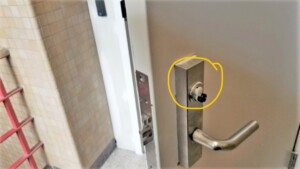
Broken lock cylinder on fire exit door.
- Assistive listening systems in meeting rooms can produce unsecured broadcasts of the content of private meetings which can be received outside of the building on simple radio scanners.
- Muilti-use auditoriums and meeting rooms often have systems installed for assistive listening. This could be for those who may be hard-of-hearing, or also for translation systems during meetings with international representatives. Some of the more common assistive listening systems use simple analog radio transmitters to broadcast the meeting audio to small receivers supplied to attendees. If the transmission are not encrypted, then the signals could easily be listened to from outside the building using readily available radio scanners or receivers. We find these system installed frequently. Both the meeting planners and the AV personnel need to be aware of the potential for compromise and ensure such systems are turned off and not used during any sensitive meetings.
- In one auditorium we found an analog radio signal that was actually being emitted from a defective piece of audio equipment- it was not even designed to be a radio transmitter. A defective circuit in a headphone amplifier was broadcasting analog signals from active microphones built-in to the conference tables. All audio from this conference area was able to be received from the parking lot just outside of the window. This vulnerability would never have been found were it not for the regularly scheduled TSCM sweep that was able to discover it.
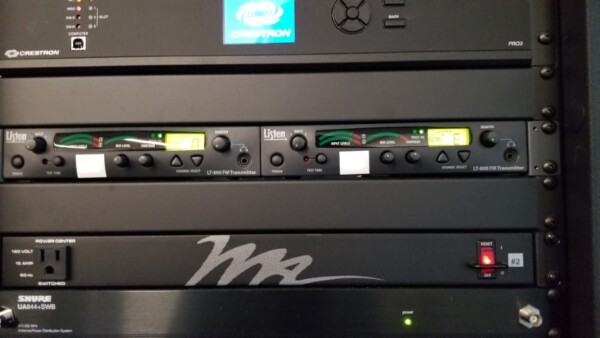
“Listen” assistive listening system transmits easily intercepted analog signals.
- Document security is another obvious concern, often not taken seriously
- Overflowing shred boxes
- Open boxes marked for confidential documents
- Unsecure confidential containers
- Documents left exposed to cleaning crews and other contractors
Please contact us if you need help securing your offices, conference rooms, and meeting areas to protect against information loss, insider leaks, or more.

